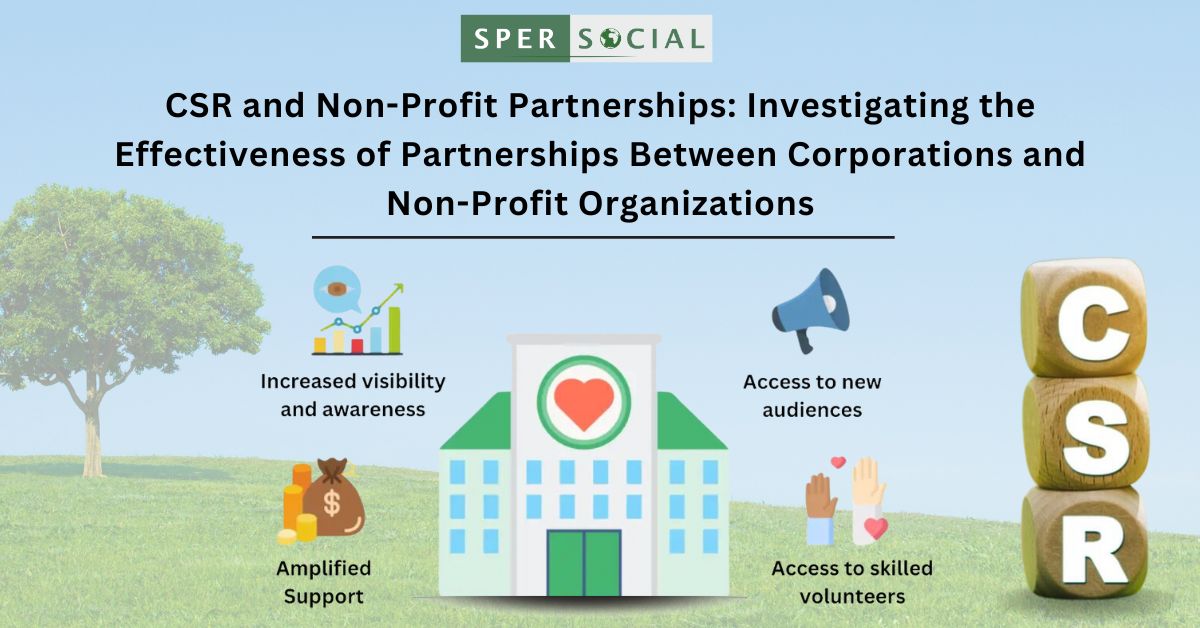
Introduction
Corporate Social Responsibility (CSR) has become a cornerstone of modern business practices, aiming to make a positive impact on society while enhancing a company’s brand and stakeholder relationships. An essential element of CSR involves partnerships with non-profit organizations. But how effective are these collaborations? This article delves into the dynamics, benefits, and challenges of CSR and non-profit partnerships, offering a comprehensive view of their effectiveness.
Understanding CSR (Corporate Social Responsibility):
Definition and Scope- CSR refers to the initiatives undertaken by companies to assess and take responsibility for their effects on environmental and social well-being. It encompasses a wide range of activities, from philanthropy and volunteering to ethical labor practices and sustainable environmental efforts.
Historical Evolution of CSR- CSR has evolved significantly over the decades. Initially driven by philanthropy, it has grown into a strategic approach integral to business operations. Today, CSR is not just about charity but about integrating social and environmental considerations into business strategies.
The Role of Non-Profit Organizations:
Definition and Purpose- Non-profit organizations (NPOs) are entities dedicated to furthering a social cause or advocating for a shared point of view. Unlike for-profit businesses, they reinvest any surplus revenues into their mission rather than distributing them as profit or dividends.
Key Functions and Impact- NPOs play a crucial role in addressing societal issues, from poverty and education to healthcare and environmental conservation. Their impact is often profound, leveraging community knowledge, volunteer networks, and targeted expertise to create sustainable change.
Benefits of CSR and Non-Profit Partnerships:
Social Impact- These partnerships can drive significant social change, addressing critical issues like poverty, health, and education more effectively than either entity could alone.
Corporate Benefits- For corporations, partnering with non-profits enhances brand reputation, engages employees, and builds customer loyalty. It can also open up new markets and improve risk management.
Non-Profit Advantages- Non-profits gain access to corporate resources, including funding, expertise, and technology. These partnerships can also help raise awareness and credibility for their causes.
Challenges in CSR and Non-Profit Partnerships:
Common Obstacles- Challenges include misaligned goals, communication barriers, and differing organizational cultures. Corporations might focus on business outcomes, while non-profits prioritize social impact.
Strategies to Overcome Challenges- Successful partnerships require clear communication, aligned objectives, and mutual respect. Regular meetings, transparent reporting, and adaptive strategies can help bridge gaps.
Strategies for Building Effective Partnerships:
Best Practices for Corporations- Corporations should ensure their CSR goals align with their core values and business objectives. Engaging employees in CSR activities and maintaining transparency with stakeholders are crucial.
Best Practices for Non-Profits- Non-profits should seek partners whose missions align closely with their own. They should also be prepared to communicate their needs clearly and demonstrate the impact of the collaboration.
Role of Communication in Partnerships:
Importance of Transparency- Transparent communication builds trust and ensures that all parties are on the same page. It helps in setting realistic expectations and avoiding misunderstandings.
Effective Communication Strategies- Regular updates, joint press releases, and open channels for feedback are essential. Both parties should celebrate successes together and address challenges promptly.
Innovative Approaches in CSR Partnerships:
Emerging Trends- Trends such as impact investing, social enterprises, and technology-driven solutions are shaping the future of CSR partnerships. These innovations offer new ways to address social issues.
Technology and Innovation in Partnerships- Technology can enhance CSR efforts through data analytics, digital platforms, and social media. It enables better tracking of impact, wider outreach, and more effective campaigns.
The Future of CSR and Non-Profit Collaborations:
Predictions and Trends- The future looks promising with increased emphasis on sustainable development goals (SDGs), more integrated approaches, and greater corporate accountability. Companies are likely to engage in deeper, more strategic partnerships.
The Evolving Landscape- As societal expectations evolve, so will CSR practices. Companies and non-profits must stay agile, adapting to new challenges and opportunities to remain effective.
Global Perspectives on CSR Partnerships:
Case Studies from Different Regions- In Asia, partnerships often focus on education and disaster relief. In Europe, environmental sustainability is a major theme, while in Africa, health and poverty alleviation are key priorities.
Cultural Influences on Partnerships- Cultural differences can influence how partnerships are formed and managed. Understanding local contexts and values is crucial for the success of global CSR initiatives.
Policy and Regulatory Framework:
Government’s Role- Governments can support CSR efforts through favorable policies, tax incentives, and public recognition. They can also facilitate collaborations by providing platforms for dialogue and cooperation.
Key Regulations Affecting Partnerships- Regulations related to corporate governance, environmental standards, and social responsibility impact how CSR activities are conducted. Compliance ensures legitimacy and accountability.
Conclusion:
CSR and non-profit partnerships have the potential to create significant positive change. By leveraging each other’s strengths, corporations and non-profits can address societal challenges more effectively. While challenges exist, strategic planning, clear communication, and mutual respect can overcome them. As these partnerships continue to evolve, they promise to drive sustainable development and social well-being.
SPER SOCIAL
SPER SOCIAL, your premier destination for innovative solutions in Corporate Social Responsibility (CSR) and Environmental, Social, and Governance (ESG) initiatives. At SPER SOCIAL, we pride ourselves on our expertise, tailored solutions, global perspective, and commitment to long-term impact. With a passion for sustainability and a dedication to making a difference, we empower organizations to navigate the complexities of CSR and ESG with confidence and purpose.
#303-304, Tower B, Noida One, Sector 62, Noida, India
contact@spersocial.com
+1-347-460-2899
+91-959-915-8047
